Wilmington, DE – Governor Markell brought together state NAACP and law enforcement leaders Friday to discuss issues around the relationship between the police and the African-American community and ways to help ensure safety and opportunity for all Delawareans. The meeting specifically addressed future use of body cameras by law enforcement, with agreement that use of the cameras are inevitable and a positive step, but that some key questions must be resolved before they are deployed to ensure their success. Attending the meeting with the Governor were Department of Safety and Homeland Security Secretary Lew Schiliro and State Police Colonel Nate McQueen, along with State NAACP President Richard “Mouse” Smith, who was joined by Jane Hovington, President of the Lower Sussex Branch of the NAACP, and Fay Blake, Economic Development Chair of the Lower Sussex Branch.
They released the following statements about the discussion:
“I thank the leaders of the State NAACP for all of their efforts to advance civil rights in our state,” said Markell. “We had an important discussion laying out the issues that need to be resolved to responsibly introduce body cameras in our state. Just as importantly, we talked about the need to continue to have an open dialogue about the issues facing our African-American community and to help build trust between their community and our law enforcement.”
“The State NAACP had a very positive meeting with Governor Markell, Secretary Schiliro and Colonel McQueen,” said Smith. “This is part of an important process of bringing together the community and law enforcement to introduce these cameras in the right way. We want the benefits of the cameras, but also to ensure that the rights of the citizens and the police are recognized, respected, and protected. We thank the Governor and State Police for agreeing that this is an important issue and that we need to move forward to meet the concerns of the citizens of Delaware.”
“We know the use of body cameras is inevitable and we view these cameras as a positive step that can help protect the rights of citizens and the police,” said Lew Schiliro, Secretary of the Department of Safety and Homeland Security. “We will need to address privacy, procedural, and technical issues and look forward to continuing to work with NAACP and other organizations to get our policies right around these cameras.”
“I appreciated the opportunity to take part in this constructive dialogue with the NAACP and ensure we are addressing these issues together,” said State Police Colonel Nate McQueen. “I look forward to continuing the dialogue.”
###

